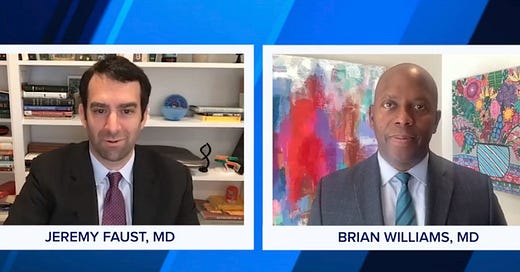Voices in medicine: A trauma surgeon thrust into the spotlight. Plus, conversations about drug shortages and navigating medical training.
I’ve done a handful of interviews for MedPage Today over the last month that I want to share with you. I’m always grateful that the MedPage team matches me up with important and insightful voices in medicine and gives me the opportunity to get into their minds and benefit from their experience-earned knowledge.
So…let’s catch you up on all that I have been learning from a diverse array of superb guests.
Advice for Incoming Residents.
If you’ve ever wondered what residency is like, this one will definitely take you Inside Medicine. Last month, I interviewed Dr. Adriana Wong, MD, MPH, a fellow in reproductive endocrinology and infertility at the Los Angeles General Medical Center. We discussed the intricacies of the residency process. How do medical students choose a field? Once in residency, how do they navigate the tougher moments? Is the match system the best we can do? If any of that sounds interesting—and it is, especially because Dr. Wong is such a great communicator—check it out here.
How the Chemotherapy Shortage Is Affecting Frontline Clinicians and How Vital Drug Shortages Happen.
In my interview with Dr. Eleonora Teplinsky, MD, head of Breast and Gynecologic Medical Oncology for Valley-Mount Sinai Comprehensive Cancer Center in Paramus, New Jersey, we covered what it’s like for frontline oncologists like Dr. Teplinsky to treat patients with cancer when key drugs are actually hard to get. Wait, you must be thinking, this is America. Chemotherapy shortages?! Yup. Here’s the link to our conversation.
Then, in my interview with Dr. Marta Wosińska, PhD, senior fellow of economic studies at the USC-Brookings Schaeffer Initiative on Health Policy, we delved into the mechanics and fundamentals of why drug shortages continue to happen and what the US needs to do about it. Spoiler: it’s not a tweak or two. The system needs a reboot. You can find this highly informative (and wonky in the best possible way, I think) conversation by following this link.
Full disclosure: I actually interviewed two experts on drug shortages at the same time. But in post-production we split them up because they covered fairly distinct territory.
A Black Trauma Surgeon on 'Racism, Violence, and How We Heal.’
Lastly, I interviewed Dr. Brian H. Williams, MD, a trauma surgeon, who has written a forthcoming book entitled “The Bodies Keep Coming. Dispatches From A Black Trauma Surgeon On Racism, Violence, And How We Heal.”
Dr. Williams was the team leader the night of July 7, 2016, at Parkland Hospital in Dallas, TX, which was the receiving hospital for a shooting that caused the largest loss of US law enforcement life since 9/11. Add to that that Parkland Hospital is an historic place in US medical lore—not the least of which because it is where JFK was rushed after he was shot, and declared dead (and Oswald too, two days later).
I may write an entire review of this book, because there was just so much there that made me reflect about both medicine and our civic lives—and which we didn’t have time to fully discuss in the interview—and I’d like to share that with you more fully.
We did cover a lot, though. Just to give you a sense of who Dr. Williams is (and what he both contributed to public life and has endured from it), let me share one passage from the book. In the wake of July 7, 2016, Williams’s wife urged him to do something that went against his instincts—to speak out. “You’re the only person in the world with this experience,” she pointed out. “A Black trauma surgeon who tried to save the white police officers shot by a Black man because of racist policing.”
She was right, of course, and Dr. Williams rose to the moment, saying to the officers in the room of a press conference (and therefore to officers around the country watching on live TV), "I support you. I defend you. I'll care for you. That does not mean I do not fear you." It’s a powerful moment at the center of an important story.
Please check out our interview. I think you’ll find what Dr. Williams has to say fascinating and inspiring.
Who would you like to see interviewed on Inside Medicine? Leave your suggestions below and I’ll see what I can do!




